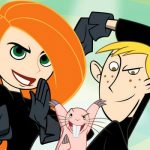Glitz, Diversity, and Representation in “The Proud Family” Revival
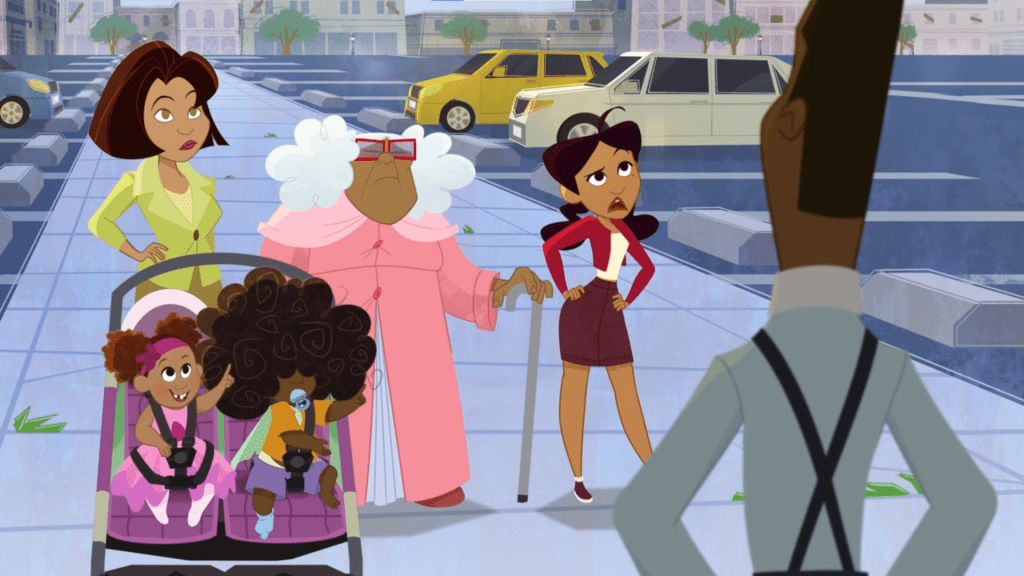
On February 23, 2022, The Proud Family: Louder and Prouder premiered on Disney+. This series tells the story of 14-year-old Penny Proud and her family as they navigate their lives in the California town of Smithville, from the schoolyard to the home.
The Proud Family: Louder and Prouder is a coming-of-age animated comedy and sitcom by two Black men, Bruce W. Smith and Ralph Farquhar. It is a reboot of the acclaimed two-season animated series, The Proud Family, which aired on the Disney Channel from 2001 to 2005. Smith is also known as a director of films such as Bébé’s Kids and Hair Love, and co-creator of Da Boom Crew.
Spoiler Warning: This theme-centric post discusses some spoilers for The Proud Family: Louder and Prouder.
Trigger Warning: This post mentions sensitive topics such as homelessness, sexism, bullying, and abusive families.
The first season of this all-ages animated series began with a bang. The first four episodes focused on the inhumanity of zoos, power of social media influencers, basketball, remaining true to who you are, standing up for your values, and homophobia, as I pointed out in my series recommendation on March 13.
The other six episodes in season one continue to focus on pertinent themes. This includes amusement parks, ride-sharing apps, college life, homelessness, crowdfunding, Latine culture, genealogy, and reality shows.
The animation remains smooth and defined throughout all 10 episodes of The Proud Family: Louder and Prouder. This is accompanied by spoken Spanish with subtitles. That’s an improvement from the original, which had no subtitles for Spanish speakers, and storylines which pull you in. The same can be said for the show’s pop music, with tunes which showcase the character’s talents.
The voice actors shine through in all the episodes, as do the recurring or guest stars. This includes people such as Brenda Song, who voices reporter Vanessa Vue, Logan Browning, Bresha Webb, Lena Waithe, Jaden Smith, and Tiffany Haddish.
Social commentary
In keeping with the original series, The Proud Family, this series continues to engage in social commentary on various issues. This includes worker/animal exploitation by Penny’s father, Oscar (voiced by Tommy Davidson). He has a monkey named Mr. Chimps who works for his business, Proud Snacks, which makes disgusting snacks but happens to stay in business.
In the show’s sixth episode, Penny and her friends begin a ride-sharing business named Get-In, where people can work for a small amount of pay. All of Penny’s (voiced by Kyla Pratt) friends, apart from Zoey (voiced by Soleil Moon Frye), abandon her in this endeavor. She becomes successful after gaining popularity on social media for the app. But, this doesn’t last. Thanks to Oscar, her business crashes and burns, as Mr. Chimps is driving a taxi without a license.
In a later episode, Penny, tired of her parents, summons Al Roker (voiced by himself). He transports her to an alternative episode where she is in college for a week, saying that if she stays after that period, it is permanent.
While there, she becomes enthralled in the party scene, drives recklessly, and falls behind in her classes. As a result, her friends leave, with Maya (voiced by Keke Palmer) calling it a “glorified plantation”. In the process, she becomes indebted to Roker, telling her that she needs to pay tuition, go to class, and pay her food tab.
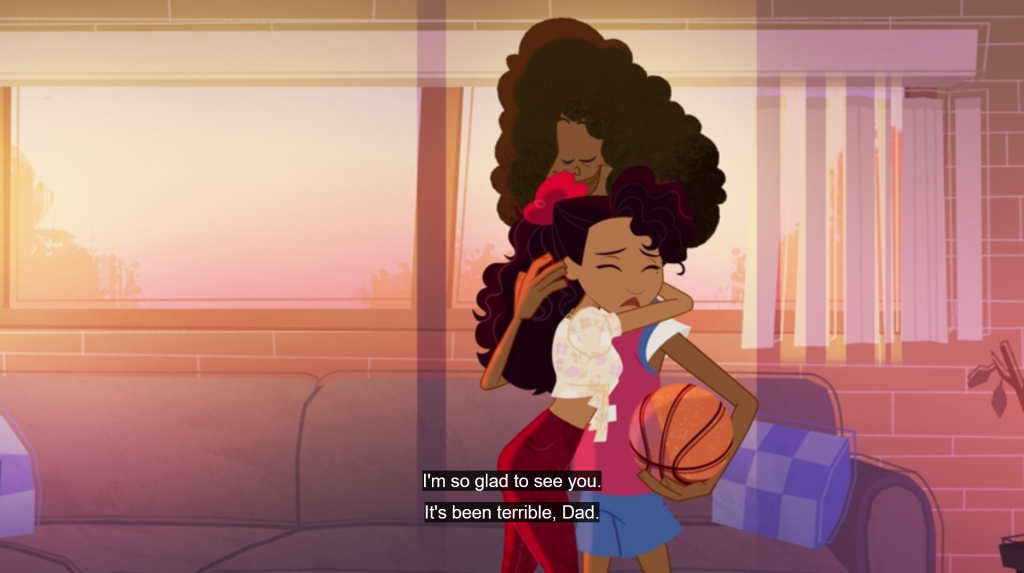
The episode shines a light on precarity of college students exploited through student debt and their financial situations. In order to pay off her debt, she has to sell junk and be in class or she will be there for eternity. There is also a scene where she sells school books back to the college library. She receives $3.50 for them, even though she spent over $1,000 for the books.
In other episodes of The Proud Family: Louder and Prouder, homelessness is highlighted as an issue. In the show’s eighth episode, Penny and her friends work together to help a strict substitute teacher, Ms. Hill (voiced by Tiffany Haddish). The school fired her after people learned that she was living in the school since she had nowhere else to live.
Although Ms. Hill causes consternation in Penny’s home, insulting her family members and forcing them to take Black history classes, Penny becomes her biggest advocate. In a school assembly, she tells students that teachers should get paid a living wage. She also asks people to contribute to a fund allowing Ms. Hill to find a decent place to live.
Due to the students’ perception of Ms. Hill, they bristle at the idea that that give money to her. Thanks to Zoey’s dance going viral, they are able to raise enough money. In the end, Ms. Hill goes off with Penny’s uncle, Bobby, and both are romantically engaged.
Family strains and the importance of family
Like Disney series such as Kim Possible, Phineas & Ferb, The Ghost and Molly McGee, and Milo Murphy’s Law, there is a focus on the value of family. This follows Disney’s family-friendly brand.
In The Proud Family: Louder and Prouder, this is not without strain. Penny often clashes with her father, Oscar, who interrupts her date with her boyfriend, Kareem, and puts parental blocks on her laptop. However, she gets around this, in one episode, by using a burner phone.
Time and time again, Penny realizes the importance of being grown and bonds with Oscar. In one episode, she apologizes to Oscar. She asys that she thought that being alone was going to be easy but isn’t ready for it. He reassures her that she has time to figure it out and that before she is on her own, her family has got her back.
Throughout the first season, Oscar and Penny have important bonding moments. This offsets any negative characteristics which could be seen as reinforcing stereotypes.
At times, Oscar seems like he is being sexist and stuck in the old ways, like when he declares that “cooking is a woman’s job”. However, Penny also believes that cooking is her mom’s job.
Oscar is as much of a loving father as Homer is in The Simpsons or Anne Boonchuy’s father in Amphibia. He cares about Penny, although he isn’t always the best at showing it.
The family’s dynamics are colored by continued tensions between Oscar and his wife, Trudy (voiced by Paula Jai Parker), as she often belittles him for his inane antics. At other times, they come together and enjoy each other’s company.
Oscar’s beliefs are not unique, in this regard. Bobby (voiced by Cedric the Entertainer) is also shown to be somewhat sexist. In one episode, he acts like he is going to help Zoey with her dancing and instead he makes her do all sorts of housework. On the one hand, he does help her by having her listen to funky music and gives her certain dance moves, allowing her to dance on stage. On the other, how he acts toward Zoey says something about his character and his treatment of women.
Suga Mama Proud (voiced by Jo Marie Payton), Penny’s hip wrestling grandmother, has a continued presence in the Proud household. Even though she has her own place to live, she often hangs out in the Proud house. She is the mother of Oscar and Bobby, and has an ongoing courtship with Papi Boulevardez, a grandfather of their Latine neighbors.
Throughout the series, consistent with the original series, she often ribs on her son, Oscar. She tends to like her other son, Bobby, who often talks like 1970s funk bands, better than Oscar, to his great annoyance.
Diversity and Latine culture
In my original recommendation of the series, one of the show’s creators, Ralph Farquhar, argued that The Proud Family: Louder and Prouder will portray more than a singular “view of Blackness or a Black family”. This is also true when it comes to Latine culture. The show prominently features LaCienega Boulevardez (voiced by Alisa Reyes), her parents Sunset (voiced by Maria Canals-Barrera) and Felix (voiced by Carlos Mencia), and others in her family.
LaCienega is the Latine frenemy of Penny, with both often disliking one another, but still have respect for one another. Although LaCienega’s exact ethnicity is not yet known, the series deserves praise for focusing and featuring Afro-Latine characters. This is strongest in the ninth episode of the series.
In that episode, LaCienega, known as LaCi for short, prepares for her quinceañera, a celebration of her 15th birthday, marking the celebration from girlhood to adulthood. She is terrified by her cousin, LaBrea Avanúñez (voiced by Princess Nokia) attending, along with her aunt, Melrose (voiced Eva Longoria), who has a habit of putting people down, including her own daughter!
Sunset’s jealousy of Melrose, leads her to spend a huge sum on quinceañera, terrifying Felix. Not surprisingly, Oscar does not understand why so much money is being spent. LaCi ends up lashing out at her friends and LaBrea seems like the troublemaker behind it all.
The fancy outfits, photos together, and glitz fade into nothingness, due to a plan by LaBrea to “get rid” of LaCi, by tying her to a rocket, so she can live with Sunset. When confronted with LaCi hanging from a dangerous ride, not far from death or serious injury, she gives LaCi advice that saves her life. She then covers for LaBrea, instead of admitting that she is is the cause of the situation.
On the surface it might appear that LaBrea is let off the hook for trying to “disappear” LaCi, and for the years of bullying her. It could even be argued that LaCi’s gesture is unrealistic and problematic. However, there is another side to her actions.
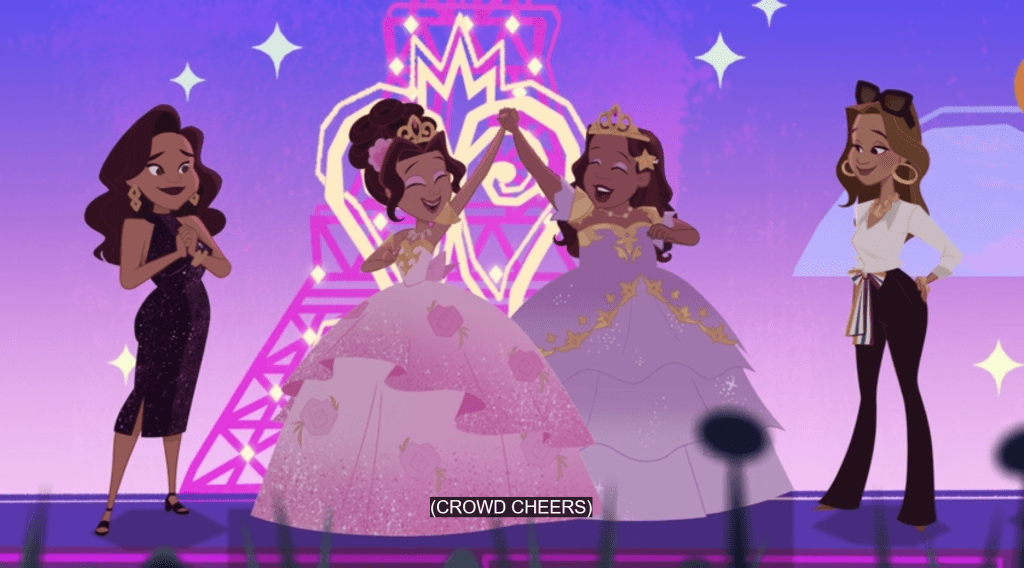
While it is not known whether LaCi fully forgives LaBrea, she comes out of her shell more. Both have a quinceañera together. Melrose apologizes to Sunset for being angry for all those years, saying that her divorce stressed her out. It is also revealed that LaBrea is plus-sized, a fact that her mom forced her to keep hidden. The episode ends with Felix worried about all the money they spent for it. Even so, he is glad as long as LaCi is happy, even though they spent her college fund on the party, and Sunset gives him a kiss.
In this way, the series shares similarities with Elena of Avalor, a series headlined by a Latine princess, Elena (voiced by Aimee Carrero). The latter series even has an episode where Elena’s “good friend”, Naomi Turner, has a quinceañera.
Hopefully these themes are expanded in the the next season of The Proud Family: Louder and Prouder, with a continued focus on Latine and Black families. In any case, as some have argued, having one show or movie about people of color doesn’t mean “equal representation.”
Family roots and genealogy
Genealogy was once a pursuit for well-off White people. This changed after the airing of Alex Haley’s Roots in the 1970s, the beginning of Henry Louis Gates’ Finding Your Roots in 2012, and the proliferation of various groups focused on the subject. It has lead to an even greater focus by the Black community than ever before.
The season one finale of The Proud Family: Louder and Prouder reflects this focus. In the episode, Trudy finds out that her family, the Parkers, can trace their roots to across the country, and North Africa. She pays over $1,000 dollars on a a DNA testing website, reflecting the focus on DNA by Black people, and discovers that Suga Mama has roots in Towne, Oklahoma.
Trudy convinces her family to travel to Oklahoma. Suga Mama comes along, but not willingly, tied to the roof of the car. Later, Trudy pressures her family embers to attend the family reunion at the Towne family ranch. While there, they meet Suga Mama’s family, whose birth name is revealed to be Charlette. The audience learns that her father told her to never come back and that she left for one major reason: to escape her toxic and sexist father, who hurt her psychologically and possibly physically.
Suga Mama is given new backstory. The audience also learns that Suga Mama’s dad declared that no girls were allowed in the rodeo, even though she could easily participate. It further shows him demanding that she cook him dinner and forcing her brother to participate in her place. As the episode comes to a close, it appears that Suga Mama and her dog, Puff (visual effects by Carlos Alazraqui) depart the ranch, leaving behind the rest of the Proud family.
One reviewer for Loud and Clear Reviews described the episode as a “total blast” to review and watch. They noted that it introduces “cool new characters,” expands Suga Mama as a character, and centers on the conflict between Suga Mama and her father. The episode is significant since it brings the characters outside of Smithville, a town in California where most of the show takes place. It remains to be seen how future episodes will continue the story from the season one finale.
This focus on family history is not unique to this series. Amphibia, Carmen Sandiego, Mira Royal Detective, Infinity Train, Futurama, and Steven Universe have storylines focusing on family roots, connections, or history.
LGBTQ representation
As I wrote in February, The Proud Family: Louder and Prouder has the “promise of breaking down barriers through its inclusion of multicultural characters and families, especially those which are part of the LGBTQ, Latine, and Black communities.” There are established LGBTQ supporting characters. This includes Barry and Randall Leibowitz-Jenkins (voiced by Zachary Quinto and Billy Porter), an interracial gay couple who lives in Smithville, fathers of Maya and Francis “KG” (voiced by Artist “A Boogie” Dubose). Even more prominent is Michael Collins (voiced by EJ Johnson), a gay and gender-nonconforming friend of Penny.
Michael is into dance, clothing, and his hair looks like pastel paint strokes. It gives him a certain style unique from his look in the original series. He even dances, in one episode in front of stage with ribbon wand. This is like the one that Mega Pearl, i.e. Royal Pearl or Rose Pearl as some fans called her, used in Steven Universe Future or Maron Kusakabe in Phantom Thief Jeanne.
There are additional LGBTQ guest stars. This includes Lizzo, who sees herself as part of the LGBTQ community. She has a starring role in the show’s fifth episode, telling a crowd that people they need to love themselves. Princess Nokia, also known as Destiny Nicole Frasqueri, voiced LaBrea. She is bisexual, gender non-conforming, of Puerto Rican descent, and speaks about self-love.
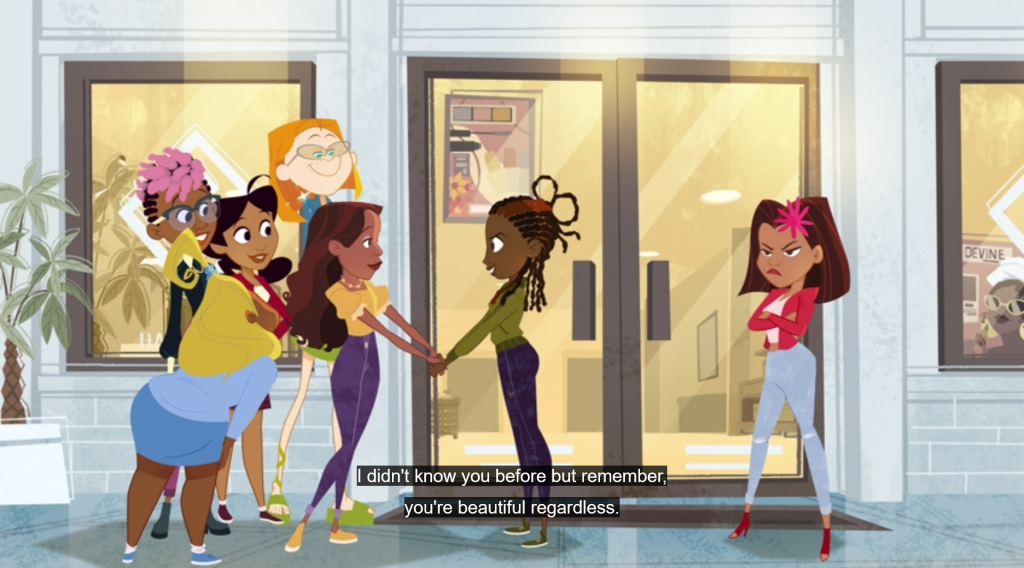
It is not known if any of the main cast have storylines which explore any possible LGBTQ identities. But, Maya hinted at the possibility in one episode, describing LaBrea as beautiful, even though she hadn’t met her before.
Even though LaBrea is likely a one-time guest star, Maya’s comment might hint at a possible romantic or sexual attraction. After all, Maya’s voice actress said in 2017 that a person’s sexuality can be fluid. She also rejected putting herself in a box and confining herself to one identity, saying that people change and grow over time.
Other guest stars showcase The Proud Family: Louder and Prouder‘s diverse stories. Jeremy O’ Harris, who voiced a college-age Michael, is Black and gay, while Lena Waithe, who voiced a college-age Maya, is a Black lesbian.
Other pertinent themes
The series often focuses on the dangers of bad business practices, with Oscar often as a foil. He runs an unsafe amusement park, Snackland, even resulting in a terrible accident. Although the news coverage is negative, people flock to Snackland even though they know they will get hurt and it is dangerous. This contrasts with when Penny as a temporarily successful businessperson. There’s also multimillionaire Wizard Kelly (voiced by Aires Spears) making his money as a professional basketball player.
One episode even provides a commentary-of-sorts on reality shows. The audience learns that Oscar once pitched the reality show, Crab Barrel, about Proud Snacks. Thanks to his weird snacks, his presentation goes horribly wrong, leading them to deny him funding. As a result, he calls the show a scam and won’t believe in it. In the episode, the other competitor is taken out of the running and judges are won over. They begrudgingly fund Penny’s ride-sharing app “by default.”
Unlike the original series, science and technology have a big showing. KG is the techy of the series, akin to Wade in Kim Possible, Darryl in The Ghost and Molly McGee, or Player in Carmen Sandiego. KG makes the ride-sharing app for Penny. In another episode, he is able to track Penny’s phone when she loses it in one episode. He also tries to save LaCi by using his drone.
It is still in contention how much the show bucks the colorism in the original series. Dijonay and the Gross Sisters, described by some as colorist stereotypes, are little changed in the reboot. Dijonay, who has a big family, is seen taking leftovers for her 10 brothers and sisters in one episode. In another, she leaks photos of Ms. Hill, the homeless teacher. She is rewarded part of a so-called “Snitches to Riches” program, wiping away her lunchroom debt. On a positive note, Pratt, who voices Penny, has said that she is attuned to the issue of colorism.
There have not been, and likely will not be, Asian stereotypes akin to those in the original series, like the Chang Triplets. Instead, Penny continues to have a “gang of girlfriends with a variety of looks and personalities”. Those people would be her friends, rather than anyone she would be romantically involved with, since she has a boyfriend in this revival series.
Where the revival falls down
There are many aspects to praise about The Proud Family: Louder and Prouder. You could say that certain scenes, like Penny using a night crawler suit with different modes, like a stealth mode, hearken back to Kim Possible. You could point out that Penny’s singing voice sounds like Candace’s deep voice in Phineas and Ferb or highlight the talented guest stars.
However, the show’s seventh episode showcases a missed opportunity. The show could have made the main characters college-age, working out problems at a local university, as they adapt to being adults in a coming-of-age story with the same tenor as this series. The series could be even strong. However, the creators, staff, or Disney could have scoffed at the idea, wanting to have the characters be the same age they were in the original show.
The series also raises the question: Are Penny’s friends actually her friends? Time and time again, her friends abandon her. Are they her actual friends or they leeches? That is a matter of opinion. Sometimes they work together well, like when they sing on stage as a group LMPDZ (LaCi, Maya, Penny, Dijonay, and Zoey) in the show’s fifth episode. At other times they don’t try to stand by Penny, throwing her away like a used dishrag.
Some fans on Reddit, Twitter, and elsewhere, have have asked why Penny is still friends with them. They have proposed that she should be a villain along with other ideas to make the series better, allowing her to be an even stronger feminist.
Despite the show’s positives, it hasn’t gotten its groove yet. At times, it appears to be too hip. It doesn’t have the original’s magnetism, with episodes focused on topics such as graffiti, Kwanzaa, spoken word poetry, karate, advertising, genetic experiments, Islam, wild animals, vacations, and elder abuse.
Unfortunately, this revival series negates 2005 film, The Proud Family Movie, as Penny is 14 years old, whereas in the film she has turned 16 years old and is exploring her life as a young adult. This series sadly implies that the whole wild film, which contains a cool battle dance scene and a Totally Spies-esque plot with human experimentation and cloning, is not canon.
Looking forward to Season 2
The season one finale ended on a cliffhanger. Since Season 2 is currently in production, the beginning of the season will continue the story from the finale. Most were excited about the news but others said it would be the second part of season 1 and that they weren’t fooling anyone. They asked when Disney would have “original animation” like The Dragon Prince, Arcane, or Tales of Arcadia. While the latter is a valid criticism, due to Disney’s focus on reboots/revivals than other original content, it is not pertinent to discuss in length in this theme-centric post.
The second season of The Proud Family: Louder and Prouder will need to answer many questions raised by the finale. The ranch where the Proud family is staying is a strange place, akin to Camp Wannaweep in Kim Possible, a source of Ron Stoppable’s trauma.
Penny encounters a huge man-fish and learns that Suga Mama’s father has blocked cell service. Trudy may suffer consequences for dragging everyone to the ranch, resulting in fissures in the Proud family. Kareem, Penny’s boyfriend, might even save them from the ranch. The whole finale gives off vibes which remind me of Jordan Peele’s Get Out.
There is a possibility that Sticky (voiced by Orlando Brown) who left in the show’s first episode, may come back in the future. My hope is that he does not return. If he became a major character again, it would up the character dynamics and cause a disruption. The new characters added in the revival are better than Sticky and build out the story more than he ever did.
The second season could also expand on Penny’s possible vegetarianism. In the season one finale she mentioned that she wanted a veggie pizza but her father rejected it. He declared it had to be a meat pizza and she did not object.
If the second season expands on Penny’s comment, it should be a bigger part of the plot than Steven Universe’s off-hand comment that he is vegetarian in an episode of Steven Universe Future. At the time, Steven’s comment led to division among the fanbase on whether the fans should embrace it or denounce it. Penny is a woman with strong principles who could make the leap, but is the show’s staff willing to make it canon?
Due to the integral role of meat in Black culture, the show staff may fear that changing Penny in this way would lead to anger and challenge the beloved status of the original series and this revival. Even the writers structure an episode on her vegetarianism like other episodes, it could lead to hostility from some Black people.
Furthermore, if Penny becomes a vegetarian in the show’s second season, it could blow the doors wide open for such type of representation. Such a category includes few Black people other than M’Baku in Black Panther. And they are mostly supporting characters rather than protagonists.
Closing words
Hopefully, the series improves in the second season. Characters from other Disney series, like The Owl House, The Ghost and Molly McGee or Amphibia, could appear. The Proud Family: Louder and Prouder does work to expand diverse animated stories of Black people, also showcased in the currently airing Karma’s World, and older series such as Static Shock, The Boondocks, and Afro Samurai.
The success of this series will likely inform future projects by Farquhar and Smith. In December 2020, both signed a “wide-ranging, multiyear overall deal” to produce various series for Disney. It may do the same for Latoya Raveneau, a series director. She entered a deal in April of this year to “develop and produce animated projects” with Disney.
In the end, while I have my criticisms of the series, I look forward to seeing where it goes in the show’s second season, and beyond. This series has the potential to run for three seasons and have an animated film, similar to the original series.
The Proud Family: Louder and Prouder can be watched on Disney+, as can the original series, The Proud Family.
Author: Burkely Hermann
Burkely is an indexer of declassified documents by day and a fan fic writer by night. He recently earned a MLIS with a concentration in Digital Curation from the University of Maryland. He currently voraciously watches animated series and reads too many webcomics to count on Webtoon. He loves swimming, hiking, and searching his family roots in his spare time.
Help support independent journalism. Subscribe to our Patreon.
Copyright © The Geekiary
Do not copy our content in whole to other websites. If you are reading this anywhere besides TheGeekiary.com, it has been stolen.Read our


